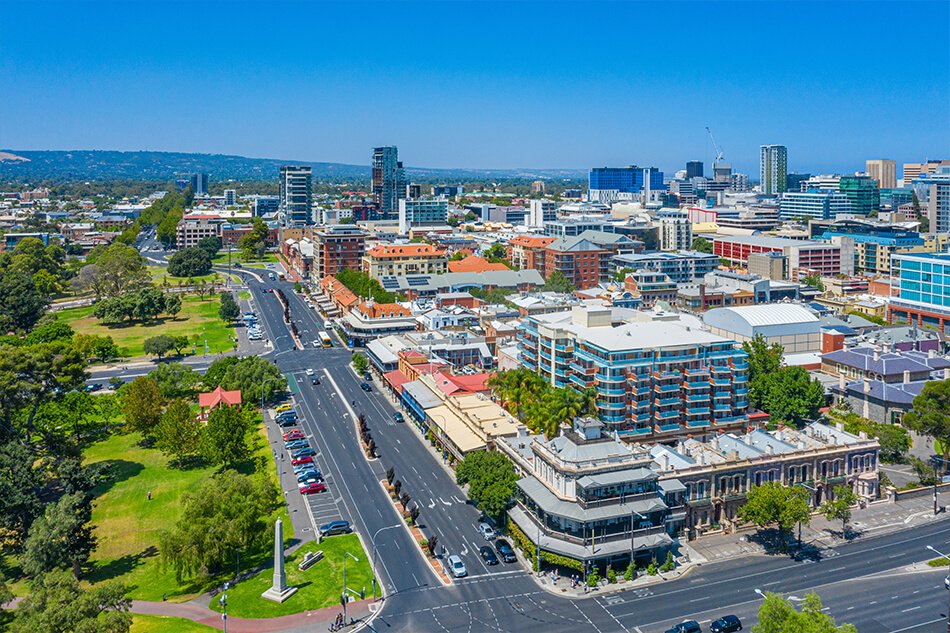- Pros of buying property interstate
- Affordable property
- Tax benefits
- Diverse property portfolio
- Cons of buying property interstate
- Different regulations
- Long-distance management
- Unfamiliarity with the property market
- 7 tips for buying property interstate
- 1. Determine your budget
- 2. Have a long-term strategy
- 3. Do your homework
- 4. Beware of costs variations
- 5. Visit the area
- 6. Assemble your team
- 7. Speak to a mortgage expert
- Where should I buy: Property Prices Across Australia
- Key Takeaways
- FAQs
Are you thinking about buying an investment property interstate? As Sydney’s property prices skyrocket to nearly $2 million, many Australians purchase properties in other cities across the country. Buying property interstate is an excellent way to diversify your investments.
But how do you avoid making crucial mistakes and make sure you get the most out of your property investment? Buying interstate is intimidating but might offer golden opportunities. Stay tuned to discover the pros and cons of investing in interstate property.
Pros of buying property interstate
Buying property interstate is riskier than purchasing an investment property just next door. After all, you can’t regularly check on your investment if you’re a ten-hour drive away – or more. However, there are some positives to interstate property investments.
Affordable property
As we mentioned, property prices in Sydney are reaching massive levels. Historical prices have increased 300 – 400%, making it nearly impossible for all but wealthy individuals to invest in Sydney. Accordingly, many investors are turning to alternative cities across Australia. Perth and Brisbane have far more affordable properties with a solid rental yield for investors.
Investing interstate enables Aussies to purchase rental property without breaking the bank. Each state’s property market differs. However, if you do your homework, you can find an interstate property with strong rental yields and high capital growth drivers.
Tax benefits
All states have different tax rules and regulations. For example, each state has different stamp duty and land tax rates. Some even offer stamp duty concessions on some property types. In Sydney, the stamp duty tax rates are
- $0 to $14,000 – 1.25%
- $14,000 to $32,000 – $175 plus 1.5%
- $32,000 to $85,000 – $144 plus 1.75%
- $85,000 to $319,000 – $1,372 plus 3.5%
In comparison, in Queensland, investors only pay stamp duty on any sum of about $5,000.
Furthermore, buying interstate offers other income tax relief. In New South Wales, property investors pay tax on the cumulative value of their properties. If you spread your investments across different states, you’ll spread your property tax payments and remain on a lower threshold.
Diverse property portfolio
Buying property across states will help diversify your investments. If you only have a property in NSW, all your assets would suffer if the property market were to plummet. However, if you have an interstate investment, your other investment should stay safe if one area were to decline.
Generally speaking, demand determines property prices. As more and more people wish to buy in a specific area, property market prices increase. However, the opposite is also true. A property market might fall if demand drops. A diverse investment portfolio should protect your properties as much as possible.
Cons of buying property interstate
Buying interstate property investment isn’t as easy as snapping up a house in the same neighbourhood as you live in. Let’s look at the downsides of investing interstate.
Different regulations
Just as states have different tax rules, they also have other local laws you may not be familiar with. If you’re buying a property interstate, you’ll need to know different regulations. This means you’ll need to understand the rules and customs surrounding owning a property interstate and the laws of home loans.
For example
- Do you need home loan pre-approval before making an offer on the house?
- What is your solicitor allowed to do? Can they review the contract before you sign it?
- What is the cooling-off period in the state?
- What is the auction procedure?
- Who draws up the sale contract?
- When do you apply for finance? Are there any grants you’re eligible for?
Long-distance management
Not only does distance make buying interstate property more challenging, but it also makes it hard to manage your new investment. Consider the costs of flights and accommodation. How much do they add to the property purchase price? Plus, you’ll need to think about hiring a property manager to maintain the rental property while you’re away.
Is your interstate investment saving you that much money by the time you tot it all up?
Thoroughly research the market before buying a property in the area. Are the rental yields high enough to cover the additional costs of property managers and other long-distance expenses?
Unfamiliarity with the property market
Unlike your home state, you probably know very little about interstate property markets. If you’re buying in another area, you need to research the new market well.
Questions that may seem straightforward in New South Wales could have different answers elsewhere. For instance, is a house or an apartment a better deal? Just because houses are the preference in your local area, it doesn’t mean the same for tenants in your investment neighbourhood.
Speak to a local buyer’s agent in the area to better understand the market.
7 tips for buying property interstate
While it’s tempting to focus on your own backyard, you can make a good investment by crossing state borders. Follow our tips to avoid hidden mistakes and become a successful borderless investor.
1. Determine your budget
As with any investment, you should determine your budget before starting anything else. Assess how much you can afford to spend on an investment property. If you have equity on another home, you can use this instead of a cash deposit on your new property. Generally speaking, lenders in all states prefer 20% deposits to avoid Lenders Mortgage Insurance.
Once you have an idea of the amount you’re willing to spend, think about which market you’d like to invest in. One advantage of investing interstate is that you can get a good idea of the right price for a home without an unbiased opinion. You may not see your own home or neighbourhood with the same objectivity.
2. Have a long-term strategy
Whether buying property or investing in shares, all investments should have a long-term strategy. Buying a property with the hope of making strong returns isn’t likely to improve your financial situation. Property investment is not a one-off event. You need to manage your investments over a long period. Therefore, it needs to fit with your other financial circumstances.
Moreover, think about the long-term behaviour of the area you’re investing in. For example, are there any development plans that could affect your real estate purchase? Population growth might drive demand up. However, demographic trends can also harm capital growth. Are there any other growth drivers, such as employment opportunities or government charges?
3. Do your homework
You need to do your due diligence and research the property area thoroughly. Beyond past prices and future plans, consider whether it’s a good investment in the present. While the latter is vital for long term growth, you also want to make short term returns.
Are there plenty of amenities and public transport links nearby? Is it an attractive place to live for tenants?
Speak to other investors in the area. Can you piece together a picture of the realities of an investment property in the area?
4. Beware of costs variations
As we mentioned, stamp duty, land tax, title transfer fees and other charges vary across Australia. You must budget these expenses before committing to a particular area. Additionally, consider the local prices of a buyer’s agent, property manager, mortgage broker, and home loan fees?
A solicitor should have an accurate idea of most of the legal and property-related expenses you’ll face. Moreover, mortgage brokers are typically paid a commission by the lender – therefore, they offer free services to homebuyers and investors.
5. Visit the area
Ideally, you want to visit the area you’re buying in. There are few substitutes for walking through the neighbourhood and speaking to the people who actually live there. Line your trip up with several open houses and attend as many as you can.
The process of buying is different in every state. Get a feel for how fast-paced the transaction is and whether there is room to negotiate.
Alternatively, if it’s not possible to visit every property firsthand, get a buyer’s agent to do the job for you. They’ll provide you with expert knowledge and local insights.
6. Assemble your team
To buy a property interstate, you will need a team of experts at your side.
- Solicitor or conveyancer – Legal requirements differ from state to state. A local conveyancer will inform you of any regulations, provide tax advice, and ensure you abide by them.
- Property manager – Speak to a property manager about the property’s condition. As they’ll be the ones managing it from day to day, they’ll tell you upfront if there are any concerns.
- Experienced mortgage broker – Speak to a trusted home loan broker with an Australian Credit Licence about getting pre-approval.
7. Speak to a mortgage expert
Getting pre-approved before visiting your interstate investment will highlight you as a serious customer. In a new, unfamiliar area, you will have a set budget that can help you start negotiations with the vendor. A broker can also help you navigate lending policies and investment loans, ensuring you maximise your borrowing power.
Where should I buy: Property Prices Across Australia
Property prices vary incredibly across Australia. Here are the average asking house prices in each state, according to SQM Research.
- Sydney, New South Wales: $1,746,303
- Melbourne, Victoria: $1,1,63,800
- Adelaide, South Australia: $683,869
- Brisbane, Queensland: $894,876
- Perth, Western Australia: $741,675
- Hobart, Tasmania: $685,121
- Canberra, ACT: $1,097,831
- Darwin, Northern Territory: $653,064
With Sydney prices nearing 2 million, it’s no wonder NSW investors are heading interstate.
Key Takeaways
Buying property interstate is mainly similar to purchasing an investment in NSW. However, here are the key takeaways.
- Property prices across Australia are far lower than in Sydney.
- Watch out for differences in regulations, taxes, and customs.
- You’ll need a property manager to look after the investment.
- You’ll need a team of experts by your side, including a buyer’s agent, solicitor, and mortgage broker.
Get the latest news and updates from Lendstreet
Join and subscribe to our newsletter.
FAQs
Can you buy a house in another state without a job there?
You don’t need to live or work in a state to buy property there. It’s as easy as finding a local lender with a licence in that state. Just remember there might be differences in laws and customs. Speak to a local buyer’s agent to help you find the right property.
Can a second home be considered a primary residence?
No, for tax purposes, you can only have one primary residence. If you live in a property for more than 12 months, it’s considered your main residence and exempt from Capital Gains Tax. However, it’s subject to CGT if you own and sell a second investment property.
Schedule a call to one of our expert mortgage broker
Ask our expert mortgage brokers anything about home loans.
Related articles
If you're buying or selling an Australian property, you'll be faced with a contract of sale. Anyone who wants to ...
Purchasing a second home or property investment is an excellent way to earn additional funds. However, buying a second home ...
Buying a house goes far beyond the initial purchase price. Negotiating the property purchase with a real estate agent is ...









